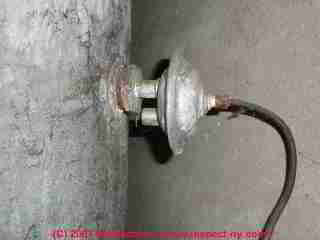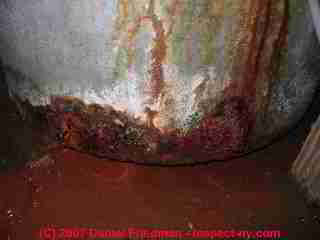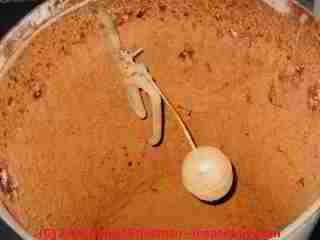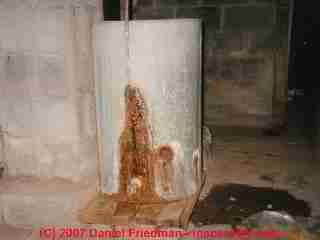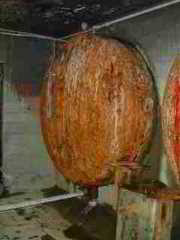 Bladderless Steel Water Pressure Tanks
Bladderless Steel Water Pressure Tanks
Choices, installation, troubleshooting, repair
- POST a QUESTION or COMMENT about this article topic.
This article describes non-bladder type steel water tanks used in building water supply systems.
These steel water tanks may be galvanized or painted, small or enormous, but in this category, none use an internal bladder to separate the tank's air charge from the water.
Page top photo: very large steel water tanks at a property usually mean that the local water source(s) are of limited output capacity.
InspectAPedia tolerates no conflicts of interest. We have no relationship with advertisers, products, or services discussed at this website.
- Daniel Friedman, Publisher/Editor/Author - See WHO ARE WE?
Steel Water Pressure Tanks, Non-Bladder Design
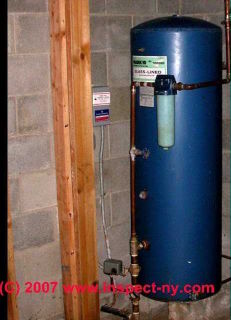 Bladderless Water Pressure Tanks (photo and sketch just below) use a single tank interior to hold both the air charge and the water supply.
Bladderless Water Pressure Tanks (photo and sketch just below) use a single tank interior to hold both the air charge and the water supply.
Bladder-less or "non-bladder" or traditional water pressure tanks may be made of steel, composite, or fiberglass, but in all cases the tank does not use an internal bladder to keep water and air separate.
Modern steel bladderless type water tanks may be coated internally to increase the water tank life by resisting corrosion.
That's what "glass lined" refers to on some water tanks.
(A "glass lined" or "epoxy coated" water tank will not be a bladder type water tank which we discussed above.)
Most bladderless water tanks include an air volume control device (AVC) intended to maintain the air charge in the pressure tank, but these devices may fail over time.
See details at WATER TANK AIR VOLUME CONTROLS
Bladderless water pressure tanks, because the air charge and water are in the same container, can lose their air charge over time (air is absorbed into the water) and may need air added.
Other Types of Bladderless Water Pressure Tanks
are described
at FIBERGLASS WATER TANKS, BLADDERLESS
and
at MORRISON WELL SYSTEM FUNCTION & REPAIR
Air Loss in Steel Water Pressure Tanks
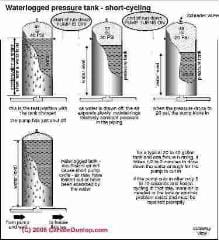 Why do water pressure tanks need an air-charge?
Why do water pressure tanks need an air-charge?
Air in the water pressure tank tank acts like a spring to smooth the delivery of water into the building as the pump cycles on and off. Since water itself is not very compressible, if we didn't have this "spring" effect that allows some water to be pushed into the building (when you open a tap) without running the pump, a normal well pump would cycle on and off very rapidly - short-cycling - when water is in use, damaging the pump.
Sketch courtesy of Carson Dunlop Associates, a Toronto home inspection, education & report writing tool company [ carsondunlop.com ].
See details at
AIR CHARGE in WATER TANK, WHY?
Why do water pressure tanks lose their air charge?
In these simpler single-internal chamber steel tanks the air charge is lost either by absorption into the water as it passes through the tank during use, or it may be lost by leaks at the tank or nearby plumbing fittings.
If a steel water tank has lost its air charge, or most of it, the condensate line on the tank will be high, near the top few inches of the tank side (unless you live in an arid climate where there is never condensation on the water tank anyway.).
How do we know a water tank has lost its air charge? Detect a waterlogged pressure tank:
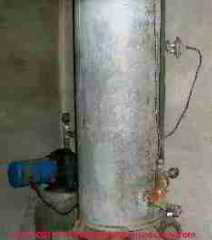 If a steel water tank has lost its air charge, or most of it, the condensate line on the tank will be high, near the top few inches of the tank side (unless you live in an arid climate where there is
never condensation on the water tank anyway).
If a steel water tank has lost its air charge, or most of it, the condensate line on the tank will be high, near the top few inches of the tank side (unless you live in an arid climate where there is
never condensation on the water tank anyway).
In this condition the steel tank is called a waterlogged water pressure tank. Such tanks will also be heavy and won't be so easily rocked or moved - a simple test we make to see if the tank is empty or full of water. (Don't move the tank so much that you cause a water piping leak!
These observations are signs pointing to a loss of the air charge in a bladderless water pressure tank:
- At the tap water pressure or flow-rate cycles between strong and weak every few seconds
- Near the water pump you hear the pump turning on-and off frequently, perhaps at intervals of 40 seconds or less
- With the pump turned off by its pressure control switch, and with the water system at full pressure (no water is being run) you may notice that a condensation line on the water tank is near the top of the tank - the tank is water-logged.
- With the pump turned off manually at the pump's power-switch, and with water pressure drained from the system, you may notice by gently-rocking the pressure tank, that it is heavy - full of water
Watch out: if your well pump or water pressure booster pump continues to cycle on and off rapidly there is risk of damaging the pump or its pressure control switch, leading to loss of water pressure and costly repairs.
See details at
WATER PUMP SHORT CYCLING - home
Also see
WATER PUMP SHORT CYCLING CAUSES
When & how to add air to a water tank
Our explanation of how to add air to a water pressure tank,
begins
at WATER TANK AIR, HOW TO ADD
Automatic ways to add air to a water tank: AVCs
Some old-style bladderless steel water pressure tanks are equipped with an air volume control device which is intended to put makeup air into the tank as air is lost or absorbed.
We discuss these
at AIR VOLUME CONTROLS but suffice it to say these often stop working. But if you see one on your water tank you know this is a non-bladder type older style water pressure tank.
Also see WATER PUMP & TANK I&O & REPAIR MANUALS
Leaks in Steel Water Tanks
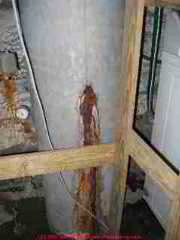
The water storage tank in the photographs above and below is leaking, having rusted through from inside the tank.
This tank is less needed for storage than to smooth or regulate the water pressure in the building as the pump cycles on and off.
Leaks like the ones in these photos can also leak the air charge out of the upper portion of the tank when the in-tank water level is below the leak point. So you might trace a water pump short cycling problem to an air loss in the tank to a leak in the tank itself.
Open Steel Water Storage Tank
This leaky and disused steel water tank, open at its top, was used to provide a building water supply.
This water tank is discussed
...
Continue reading at AIR VOLUME CONTROLS, WATER TANK, or select a topic from the closely-related articles below, or see the complete ARTICLE INDEX.
Or see these
Recommended Articles
- AIR VOLUME CONTROLS, WATER TANK
- FIBERGLASS WATER TANKS, BLADDERLESS - non-bladder, made of composite, fiberglass, or other non-steel material
- LARGE CAPACITY WATER STORAGE TANKS
- MORRISON WELL SYSTEM FUNCTION & REPAIR - no-bladder, steel, special air volume control method
- WATER PUMP & TANK I&O & REPAIR MANUALS
- WATER TANK AIR, HOW TO ADD
- WATER TANK AIR VOLUME CONTROL REPAIR
- WATER PUMP SHORT CYCLING - home
- WATER TANK BLADDERS & CAPTIVE AIR - use an internal bladder to separate air and water
- WATER TANK CONTROLS & SWITCHES
- WATER TANK DIAGNOSIS & REPAIR - home
- WATER TANK, LARGE CAPACITY
- WATER TANK AIR PRESSURE ADJUSTMENT
- WATER TANK REPAIR PROCEDURES
- WATER TANK LIFE & REPLACEMENT
- WATER TANK: USES, TROUBLESHOOTING - home
Suggested citation for this web page
WATER TANKS, STEEL at InspectApedia.com - online encyclopedia of building & environmental inspection, testing, diagnosis, repair, & problem prevention advice.
Or see this
INDEX to RELATED ARTICLES: ARTICLE INDEX to WATER SUPPLY, PUMPS TANKS WELLS & SPRINGS
Or use the SEARCH BOX found below to Ask a Question or Search InspectApedia
Ask a Question or Search InspectApedia
Try the search box just below, or if you prefer, post a question or comment in the Comments box below and we will respond promptly.
Search the InspectApedia website
Note: appearance of your Comment below may be delayed: if your comment contains an image, photograph, web link, or text that looks to the software as if it might be a web link, your posting will appear after it has been approved by a moderator. Apologies for the delay.
Only one image can be added per comment but you can post as many comments, and therefore images, as you like.
You will not receive a notification when a response to your question has been posted.
Please bookmark this page to make it easy for you to check back for our response.
IF above you see "Comment Form is loading comments..." then COMMENT BOX - countable.ca / bawkbox.com IS NOT WORKING.
In any case you are welcome to send an email directly to us at InspectApedia.com at editor@inspectApedia.com
We'll reply to you directly. Please help us help you by noting, in your email, the URL of the InspectApedia page where you wanted to comment.
Citations & References
In addition to any citations in the article above, a full list is available on request.
- In addition to citations & references found in this article, see the research citations given at the end of the related articles found at our suggested
CONTINUE READING or RECOMMENDED ARTICLES.
- Carson, Dunlop & Associates Ltd., 120 Carlton Street Suite 407, Toronto ON M5A 4K2. Tel: (416) 964-9415 1-800-268-7070 Email: info@carsondunlop.com. Alan Carson is a past president of ASHI, the American Society of Home Inspectors.
Thanks to Alan Carson and Bob Dunlop, for permission for InspectAPedia to use text excerpts from The HOME REFERENCE BOOK - the Encyclopedia of Homes and to use illustrations from The ILLUSTRATED HOME .
Carson Dunlop Associates provides extensive home inspection education and report writing material. In gratitude we provide links to tsome Carson Dunlop Associates products and services.


